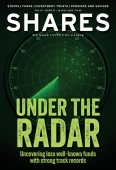Archived article
Please note that tax, investment, pension and ISA rules can change and the information and any views contained in this article may now be inaccurate.
Dividend heroes: the investment trusts with the longest track records of consistent dividend growth

Rates are starting to come down on cash savings accounts driving income-hungry individuals back into equities and bonds in search of better yields at a time when tariffs and volatile geopolitics are expected to keep inflation high.
In a scenario where central banks continue to cut rates, savers will be offered less generous interest on their cash in the years ahead. In contrast, equity income-focused investment trusts offer the potential for attractive yields for many years as well as a growing stream of dividends.
Shares has consistently championed the unique advantage investment trusts have when it comes to paying regular and progressive dividends.
For the uninitiated, these funds are able to hold back up to 15% of the income they receive from their portfolios and tuck it away in revenue reserves which can be used to boost dividends during lean spells when businesses they own may be cutting payouts.
This structural benefit has enabled many investment companies to pay consistently-rising dividends through both good and bad years for many decades, a record unrivaled by other funds such as unit trusts.
You may have heard of the AIC’s (Association of Investment Companies) ‘Dividend Heroes’, classified as trusts which have increased their dividends for 20 or more years in a row.
Impressively, 10 of these dividend heroes have over half a century of unbroken annual increases under their belts and the AIC also maintains a list of the ‘next generation’ dividend heroes, trusts with more than 10 years of consistently rising dividends but less than 20 years.
WHY DIVIDEND HEROES DESERVE YOUR ATTENTION
Annabel Brodie-Smith, communications director of the AIC, says: ‘The dividend hero investment trusts offer income seekers a consistently-rising income, with 10 dividend hero investment trusts increasing their dividends for more than half a century. Of course, dividends are never guaranteed but these track records demonstrate their durability.’
Josef Licsauer, investment trust research analyst at Kepler Partners, insists: ‘The AIC’s Dividend Heroes list is a timely reminder of the strength and resilience investment trusts can bring to an income strategy. Trusts on this list have increased their dividends every year for over two decades, with half boasting 50-plus year streaks, a remarkable achievement through inflation shocks, recessions and global crises.’
Brodie-Smith adds: ‘It’s important to do your research on the dividend heroes so you find an investment trust which meets your investment needs and risk profile. The dividend heroes and next generation of dividend heroes cover a wide range of sectors from the equity income and global sectors to UK smaller companies, infrastructure and private equity.
‘The AIC’s website is a good place to start your research as there’s lots of useful dividend data including the yield, the five-year dividend growth, dividend cover, revenue reserves and a full dividend history. There’s also a wealth of additional data including discounts, gearing, performance and charges.’
HEROIC ACHIEVEMENTS
In recent years, the concept of dividend heroes has really taken off with qualifying investment trusts eager to retain their position within the AIC’s list. After all, dividend hero status is a valuable marketing tool.
At the time of writing, 20 trusts qualify for dividend hero status, with City of London (CTY), Bankers (BNKR), Alliance Witan (ALW) and the Cayzer family-controlled Caledonia Investments (CLDN) sporting 58 consecutive years of dividend hikes apiece.
These trusts started paying their shareholders higher dividends in the same year Bobby Moore held the World Cup aloft for England and have grown distributions in every year since.
Only one of this quartet currently trades at a premium to NAV, namely the popular City of London, effectively a ‘best ideas of the FTSE 100’ investment vehicle which has benefited from owning many of this year’s best performing UK stocks and beaten the market on many occasions in the past, while also offering a decent yield.
Over the past decade, City of London Investment Trust has delivered a solid 92.6% share price total return, but the Job Curtis and David Smith-managed trust is the top-performing ‘hero’ year-to-date with a 15.8% return.
City of London traded at a premium to NAV (net asset value) for most of 2021 until 2023 but last year slipped to a 3% approximate discount; it now trades at a 1.8% premium as investors warm to the UK stock market again.
CALEDONIA JOINS THE CLUB
In contrast, the newest entrant to the 58-year club, Caledonia, trades on a wide 30%-plus NAV discount which likely reflects the self-managed trust’s significant exposure to private capital besides public companies and funds.
Originally a shipping company, founded by Sir Charles Cayzer in 1878, this global multi-asset investment company remains 49% owned by the Cayzers, making it less an investment trust and more a ‘family office’ whose job is to create and protect wealth for generations to come. Nothing demonstrates that long-term view quite like the fact Caledonia has now raised its payout for pushing on six decades.
The biggest of the four by total assets is Alliance Witan, which boasts the second-longest dividend growth track record among investment trusts. ‘With a distributable reserve of £3.7 billion, including a £55.6 million revenue reserve (as at 31 December 2024), there appears little reason to doubt the board’s ability to maintain this progressive dividend policy,’ notes QuotedData.
Hot on their heels with 54 years of consecutive payout growth to crow about is The Global Smaller Companies Trust (GSCT), which has one of the fastest five-year dividend growth records among the heroes at 11.2% and will reach the 55-year milestone on 20 August.
Paul Niven-steered F&C (FCIT), the ‘one-stop-shop’ global fund invested in more than 350 companies in 35 countries, with a formidable 10-year share price total return approaching 200% and a five-star Morningstar rating, also sports 54 years of dividend growth.
Chasing these names down are Brunner (BUT) on 53 years and JPMorgan Claverhouse (JCH) on 52 years, followed by Murray Income (MUT) and Scottish American (SAIN) with 51 years of payout growth apiece.
The heroes list also includes high-yielders Merchants (MRCH), the Simon Gergel-steered fund boasting over forty years of dividend growth, and Aberdeen Equity Income (AEI) whose dividend growth streak extends to nigh-on a quarter of a century, not to mention Murray International (MYI), a global equity income trust with a defensive approach and value bias which was recently granted hero status after raising the 2024 dividend by 2.6% to 11.8p for a 20th consecutive year of rising payouts.
Managed by Martin Connaghan and Samantha Fitzpatrick, Murray International’s distinctive style and avoidance of frothily-valued growth stocks means it brings something different to the table.
A diversified portfolio of quality companies, the managers’ focus on cash-generative firms with durable business models, wide economic moats, strong management teams and ESG credentials is reassuring at this time of geopolitical uncertainty.
WHY CLAVERHOUSE STANDS OUT
Kepler’s Licsauer notes JPMorgan Claverhouse has delivered 52 consecutive years of dividend growth. ‘That’s not just consistency, but growth with substance: since 1972, JCH’s dividend has compounded at 9% per annum, well ahead of inflation and the broader UK equity market,’ observes Licsauer.
‘Like others on the list, JPMorgan Claverhouse has drawn on one of the trust structure’s key advantages: the ability to use revenue reserves to maintain payouts in more difficult years. But rather than rely on this indefinitely, the management team has evolved the portfolio to support future dividend growth and rebuild reserves.’
He continues: ‘Today, it blends high-yielders with dividend growers and compounders, notably increasing its exposure to opportunities across the UK market. This includes small- and mid-caps which currently offer better yield and growth potential than many large-caps, and hold the potential to support dividend growth for years to come. With a 4.5% yield and a forward-looking strategy, Claverhouse’s place among the Dividend Heroes feels well-earned, and a reminder that sustainable income often comes from trusts willing to adapt, not just endure.’
Licsauer adds: ‘Investors might also want to keep an eye on the next generation of Dividend Heroes, like Fidelity Special Values (FSV), which has raised its dividend for 15 consecutive years and grown it at nearly 12% per annum since 2009, faster than inflation and with strong reserve cover to support future growth.’
Liscauer’s Kepler colleague Ryan Lightfoot-Aminoff says: ‘BlackRock Smaller Companies (BRSC) is interesting in itself due to it being focused on UK smaller companies, an asset class not typically known for its income credentials.
‘This dividend is largely an output of the process rather than a goal of manager Roland Arnold, although his focus on high-quality, cash-generative companies means that the portfolio often generates a good amount of income. Following a 22nd consecutive increase of the trust’s dividend, the historic yield is circa 3.4%, with the latest dividend a 4.7% increase on the previous year. This required a small contribution from revenue reserves, although these stand at over 90% of the most recent dividend paid.’
DISCLAIMER: James Crux has personal investments in The Scottish American Investment Company, The Merchants Trust and Fidelity Special Values.
Important information:
These articles are provided by Shares magazine which is published by AJ Bell Media, a part of AJ Bell. Shares is not written by AJ Bell.
Shares is provided for your general information and use and is not a personal recommendation to invest. It is not intended to be relied upon by you in making or not making any investment decisions. The investments referred to in these articles will not be suitable for all investors. If in doubt please seek appropriate independent financial advice.
Investors acting on the information in these articles do so at their own risk and AJ Bell Media and its staff do not accept liability for losses suffered by investors as a result of their investment decisions.
Issue contents
Editor's View
Feature
Great Ideas
Investment Trusts
News
- Currys shares climb to three-year high on resumption of dividends
- Scorching weather takes its toll on Hollywood Bowl
- Frasers Group targets Hugo Boss dividend policy and treasury shares
- Stock markets react with relief as tariff deadlines extended
- Musk risks alienating supporters with new political intervention
 magazine
magazine








